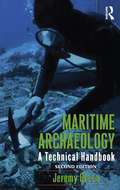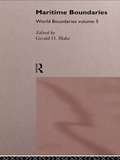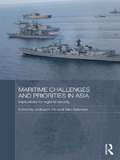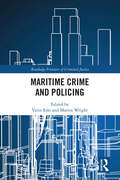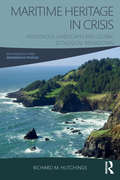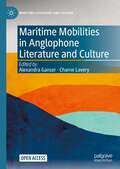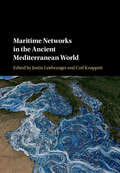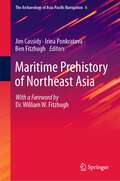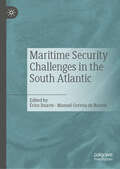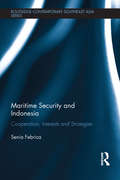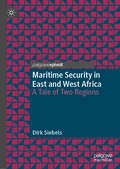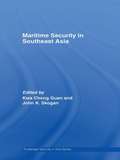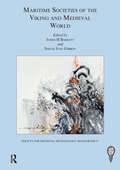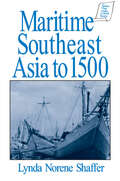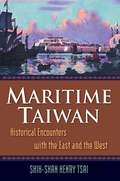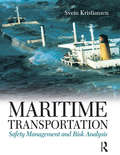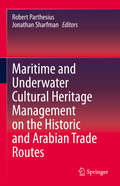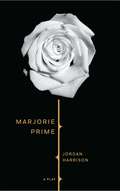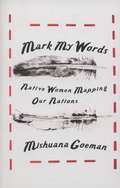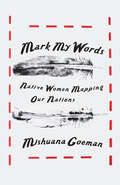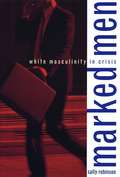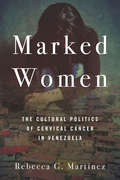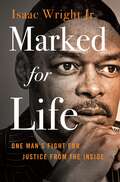- Table View
- List View
Maritime Archaeology: A Technical Handbook, Second Edition
by Jeremy GreenJeremy Green's systematic overview of maritime archaeology offers a step-by-step description of this fast-growing field. With new information about the use of computers and Global Positioning Systems, the second edition of this handbook shows how to extract as much information as possible from a site, how to record and document the data, and how to act ethically and responsibly with the artifacts. Treating underwater archaeology as a discipline, the book demonstrates how archaeologists, "looters," academics, and governments interact and how the market for archaeological artifacts creates obstacles and opportunities for these groups. Well illustrated and comprehensive in its approach to the subject, this book provides an essential foundation for everybody interested in underwater environments, submerged land structures, and conditions created by sea level changes.
Maritime Boundaries: World Boundaries Volume 5 (World Boundaries Series #Vol. 5)
by Gerald H. BlakeThe global political map is undergoing a process of rapid change as former states disintegrate and new states emerge. At sea, boundary delimitation between coastal states is continuing unabated. These changes could pose a threat to world peace if they are not wisely negotiated and carefully managed. Maritime Boundaries presents a variety of cases illustrating the implications of recent approaches to maritime territorial juristiction.
Maritime Challenges and Priorities in Asia: Implications for Regional Security (Routledge Security in Asia Pacific Series)
by Sam Bateman Joshua H. HoMaritime issues are particularly important for Asian countries, where there is a high reliance on shipping routes for international trade, many difficult disputes over maritime boundaries, and the prospect of increasing tensions where maritime power might play a significant role. This book uses contributions by 17 experts to build a comprehensive survey of the maritime issues affecting Asia. It discusses the issues overall, goes on to examine the issues from the perspective of each of 14 key countries, and concludes by assessing the prospects for resolving common problems in order to preserve good order at sea.
Maritime Crime and Policing (Routledge Frontiers of Criminal Justice)
by Martin Wright Yarin EskiThis book offers a unique and scholarly perspective on a little-studied subject: maritime crime and policing. The seas and oceans cover 70 percent of the earth’s surface and 90 percent of world trade by volume travels by sea. Furthermore, the refugee crisis has produced an inflow of people attempting to find a better life, particularly in Northwest Europe and the UK, which has had an impact on the maritime domains of European ports. While there has been attention paid to the role of maritime policing by scholars in maritime security studies, little attention has been paid by criminologists and policing studies scholars. This book aims to fill this gap. Bringing together a range of international scholars, this book covers a variety of topics pertinent to maritime crime and its policing, such as fraud, piracy and armed robbery at sea, illegal and unregulated fishing, smuggling, people trafficking, illegal immigration, illegal dumping and pollution, arms trafficking, terrorism, and cargo theft. It brings together new perspectives on several key criminological themes such as transnational organised crime, criminalisation, and securitisation and provides a bold new direction for the landlocked discipline of criminology and policing studies. An accessible and compelling read, this book will be of interest to students and scholars of criminology, policing, sociology, politics, migration studies, and all those interested in the policing of the sea.
Maritime Heritage in Crisis: Indigenous Landscapes and Global Ecological Breakdown (Archaeology and Indigenous Peoples)
by Richard M. HutchingsGrounded in critical heritage studies and drawing on a Pacific Northwest Coast case study, Maritime Heritage in Crisis explores the causes and consequences of the contemporary destruction of Indigenous heritage sites in maritime settings. Maritime heritage landscapes are undergoing a period of unprecedented crisis: these areas are severely impacted by coastal development, continued population growth and climate change. Indigenous heritage sites are thought to be particularly vulnerable to these changes and cultural resource management is frequently positioned as a community’s first line of defense, yet there is increasing evidence that this archaeological technique is an ineffective means of protection. Exploring themes of colonial dislocation and displacement, Hutchings positions North American archaeology as neoliberal statecraft: a tool of government designed to promote and permit the systematic clearance of Indigenous heritage landscapes in advance of economic development. Presenting the institution of archaeology and cultural resource management as a grave threat to Indigenous maritime heritage, Maritime Heritage in Crisis offers an important lesson on the relationship between neoliberal heritage regimes and global ecological breakdown.
Maritime Interception and the Law of Naval Operations: A Study Of Legal Bases And Legal Regimes In Maritime Interception Operations
by Martin FinkThis book considers the international law applicable to maritime interception operations (MIO) conducted on the high seas and within the context of international peace and security, MIO being a much-used naval operational activity employed within the entire spectrum of today's conflicts. The book deals with the legal aspects flowing from the boarding and searching of foreign-flagged vessels and the possible arrest of persons and confiscation of goods, and analyses the applicable law with regard to maritime interception operations through the legal bases and legal regimes. Considered are MIO undertaken based on, for instance, the UN Collective Security System (maritime embargo operations), self-defence and (ad-hoc) consent, and within the context of legal regimes various views are provided on the right of visit, the use of force and the use of detention. This volume, which has contemporary naval operations as its central focus and structures the analysis as a sub-discipline of the international law of military operations, will be of great interest both to academics, practitioners and policy advisors working or involved in the field of military and naval operations, and to those professionals wanting to learn more about the international law of military operations, naval operations, and the law of the sea and maritime security.Martin Fink is a naval and legal officer in the Royal Netherlands Navy.
Maritime Mobilities in Anglophone Literature and Culture (Maritime Literature and Culture)
by Alexandra Ganser Charne LaveryThis open access edited collection explores various aspects of how oceanic im/ mobilities have been framed and articulated in the literary and cultural imagination. It covers the entanglements of maritime mobility and immobility as they are articulated and problematized in selected literature and cultural forms from the early modern period to the present. In particular, it brings cultural mobility studies into conversation with the maritime and oceanic humanities. The contributors examine the interface between the traditional Eurocentric imagination of the sea as romantic and metaphorical, and the materiality of the sea as a deathbed for racialized and illegalized humans as well as non-human populations
Maritime Networks in the Ancient Mediterranean World
by Carl Knappett Justin LeidwangerThis volume brings together scholars of Mediterranean archaeology, ancient history, and complexity science to advance theoretical approaches and analytical tools for studying maritime connectivity. For the coast-hugging populations of the ancient Mediterranean, mobility and exchange depended on a distinct environment and technological parameters that created diverse challenges and opportunities, making the modeling of maritime interaction a paramount concern for understanding cultural interaction more generally. Network-inspired metaphors have long been employed in discussions of this interaction, but increasing theoretical sophistication and advances in formal network analysis now offer opportunities to refine and test the dominant paradigm of connectivity. Extending from prehistory into the Byzantine period, the case studies here reveal the potential of such network approaches. Collectively they explore the social, economic, religious, and political structures that guided Mediterranean interaction across maritime space.
Maritime Prehistory of Northeast Asia: With a Foreword by Dr. William W. Fitzhugh (The Archaeology of Asia-Pacific Navigation #6)
by Ben Fitzhugh Jim Cassidy Irina PonkratovaThis book addresses a void in the synthetic archaeological knowledge of the North Pacific by enabling a more informed evaluation of North Pacific Rim seafaring hypotheses. It answers questions about intra- and inter-regional relationships in the evolution of maritime adaptations throughout the region. The authors collectively address evidence of aquatic activities during the Late Pleistocene and Holocene in the Sea of Japan, Sea of Okhotsk and adjacent coastal areas of Korea, Japan, Sakhalin Island, the Kurile Islands and the Russian Far East with syntheses placing the region into a larger North Pacific context. This examination provides essential data on human modes of terrestrial adaptation and the transition to maritime lifeways over the last 40,000 years. It also provides a much-needed foundation to better understand the peopling of the New World 17,000 years ago, either by a pedestrian transit or through the use of watercraft, or more likely a combination of the two. As one of the first publications on the prehistory of the maritime region of Northeast Asia provided in English, with contributions by leading Korean, Japanese, Russian, Canadian, European and US-based researchers of the region, this volume presents a means for archaeologists to assess proposed hypotheses pertaining to late Pleistocene and Holocene seafaring around the North Pacific Rim. It is an essential read for specialists in history, archaeology, behavioural ecology and maritime evolution.
Maritime Security Challenges in the South Atlantic
by Érico Duarte Manuel Correia de BarrosThis edited volume focuses on the South Atlantic regional and national issues with maritime implications: naval policy, security, transnational organized crime, and Europe's legacy and current influence. The work analyzes the positions in favor and against NATO’s extended role in the South Atlantic, the historical and current issues related to the Falklands War, the African national deficits, and initiatives to attend the regional maritime problems. Including contributions from Angolan, Brazilian, Senegalese, and US collaborators, the volume offers eclectic conceptual frameworks, rich historical backgrounds, updated data, original analysis models, and policy recommendations.
Maritime Security and Indonesia: Cooperation, Interests and Strategies (Routledge Contemporary Southeast Asia Series)
by Senia FebricaIndonesia is the largest archipelago state in the world comprising 17,480 islands, with a maritime territory measuring close to 6 million square kilometres. It is located between the two key shipping routes of the Pacific and Indian Ocean. Indonesia’s cooperation in maritime security initiatives is vitally important because half of the world’s trading goods and oil pass through Indonesian waters, including the Straits of Malacca, the Strait of Sunda and the Strait of Lombok. This book analyses Indonesia’s participation in international maritime security cooperation. Using Indonesia as a case study, the book adopts mixed methods to assess emerging power cooperation and non-cooperation drawing from various International Relations theories and the bureaucratic politics approach. It addresses not only the topic of Indonesia’s cooperation but also engages in debates across the International Relations, political science and policy studies disciplines regarding state cooperation. Based on extensive primary Indonesian language sources and original interviews, the author offers a conceptual discussion on the reasons underlying emerging middle power participation or non-participation in cooperation agreements. The analysis offers a fresh perspective on the growing problems of maritime terrorism and sea robbery and how an emerging power deals with these threats at unilateral, bilateral, regional and multilateral levels. The book fills a significant gap in literature on Indonesian foreign policy making in the post-1998 era. It provides the first in-depth study of Indonesia’s decision making process in the area of maritime security and will thus be of interest to researchers in the field of comparative politics, international relations, security policy, maritime cooperation, port and shipping businesses and Southeast Asian politics and society.
Maritime Security in East and West Africa: A Tale of Two Regions
by Dirk SiebelsThis book examines the nexus between maritime security and the ‘blue economy’ in sub-Saharan Africa. In recent years, maritime security issues have received increasing attention, but academic and policy-related discussions are largely limited to counter-piracy operations and, to a smaller extent, problems related to illegal fishing. This project offers an essential addition to the current academic and political discourse, combining a broad range of statistics with primary research and findings from more than 40 interviews with key stakeholders. It provides a unique analysis, recognizing that maritime security is not an end in itself but rather linked to economic and immaterial benefits of a more secure environment at sea.
Maritime Security in Southeast Asia (Routledge Security in Asia Series)
by Kwa Chong Guan John K. SkoganThis book confronts both the maritime security challenges and responses. In Southeast Asia, maritime security has, over the last twenty years, taken on a much greater importance, due to the Law of the Sea convention, which has resulted in a 200 nautical mile Exclusive Economic Zones (EEZs). As well as traditional security threats to maritime security, there has also emerged a range of non-traditional threat, such as those emanating from piracy and international terrorism that spill over into the maritime domain. Events such as September 11th, and the designation of Southeast Asia as a 'second front' in the war against terrorism, have resulted in the growing realization that multilateral security cooperation is required in order to better manage emerging security threats. Expert contributors to this book identify the nature of the maritime security problem and critically evaluate the various responses with an eye to improving the management of prevailing and emerging security threats. This book will be an invaluable resource to academics, policy analysts, legislators and students interested in security issues in Southeast Asia.
Maritime Societies of the Viking and Medieval World (The Society for Medieval Archaeology Monographs)
by Sarah Jane Gibbon James H BarrettThis book is a study of communities that drew their identity and livelihood from their relationships with water during a pivotal time in the creation of the social, economic and political landscapes of northern Europe. It focuses on the Baltic, North and Irish Seas in the Viking Age (ad 1050–1200), with a few later examples (such as the Scottish Lordship of the Isles) included to help illuminate less well-documented earlier centuries. Individual chapters introduce maritime worlds ranging from the Isle of Man to Gotland — while also touching on the relationships between estate centres, towns, landing places and the sea in the more terrestrially oriented societies that surrounded northern Europe’s main spheres of maritime interaction. It is predominately an archaeological project, but draws no arbitrary lines between the fields of historical archaeology, history and literature. The volume explores the complex relationships between long-range interconnections and distinctive regional identities that are characteristic of maritime societies, seeking to understand communities that were brought into being by their relationships with the sea and who set waves in motion that altered distant shores.
Maritime Southeast Asia to 500
by Lynda Norene ShafferA history of the fabled islands of Southeast Asia from 300 BC, by which time their inhabitants had learned to sail the monsoon winds, to AD 1528, when Islam became dominant in the region.
Maritime Taiwan: Historical Encounters with the East and the West
by Shih-Shan Henry TsaiFor centuries the island of Taiwan, 100 miles off the Asian mainland, has been a crossroads for traders and settlers, pirates and military schemers from around the world. Unlike China, with its long tradition of keeping foreigners out, Taiwan has a long history of interaction, both hostile and friendly, with other seafaring nations near and far. "Maritime Taiwan" captures the full drama and details of this remarkable history. It's filled with fascinating stories of foreign adventurers and echoes the bitter songs of Taiwan's aboriginal population, confronted by the convergence of different maritime cultures and values on the island.Here are accounts of the legendary pirate Koxinga, the Chinese junk trade, the mighty Dutch East India Company, British opium traders and Scottish tea merchants, Jesuit priests and Presbyterian missionaries, A French fleet commander, a Japanese colonial administrator, an American aid official, and many more. Here too is an extraordinary view of Taiwan over the centuries, as its distinct identity, culture, and values were shaped by its unique history. Today, with a population of only 23 million, Taiwan is the world's nineteenth largest economy, a vibrant, relatively free society on the strategic route between China and Southeast Asia. Maritime Taiwan also discusses the significant impact of American military, economic, educational, and technological aid on Taiwan's developments and addresses the island's continued importance in maintaining the U.S. hegemony in East Asia.
Maritime Transportation: Safety Management And Risk Analysis
by Svein KristiansenFirst Published in 2005. Routledge is an imprint of Taylor & Francis, an informa company.
Maritime and Underwater Cultural Heritage Management on the Historic and Arabian Trade Routes
by Robert Parthesius Jonathan SharfmanThis book brings together perspectives on maritime and underwater cultural heritage (MUCH) in selected countries around the Indian Ocean rim that are linked by the historic and Arabian maritime trade routes. It explores how selected countries have adapted maritime archaeological and UCH management methodologies rooted in western contexts to their own situations. It assesses how new heritage management burdens have been placed on states by outsiders wishing to conserve their own heritage in foreign waters. It investigates what these new pressures are and asks what the future holds for the region. Each chapter outlines the development of MUCH in the author’s home nation, provides an overview of current frameworks and activities, and looks to the future of research and management. The chapters draw conclusions regarding what has driven the process of developing individual approaches and perspectives and what the results have been. They ask if the focus is on management or research, and if the MUCH vision is focused seaward or towards the hinterland. A common thread that binds the chapters is the adaptation of western management and practice structures to contexts where the binaries such as tangible and intangible, natural and cultural, and submerged and terrestrial become blurred. It examines how states have confronted management and research challenges on sites that are validated primarily by European expansion perspectives.
Marjorie Prime (TCG Edition)
by Jordan Harrison"A thought-provoking play about memory, its corruption and our insistence that technology help us outwit death."—The New York Times "It's the kind of experience that keeps unfolding in the mind long after the play is over."—Los Angeles TimesIn a future not far from our present, Marjorie spends her time rewriting her past in favor of her idealized memories, with help from the intriguingly innovative technology that allows her to do so. With deeply felt characters – both real and in the form of holograms or "Primes"—Jordan Harrison's widely acclaimed new play burrows into the most troubling questions of the digital age: are we replacing our memory with a false reality, and what does that mean about the preservation of the truth? Marjorie Prime ultimately asks whether manipulating our past is a corruption of history or a welcome consolation. Jordan Harrison's other plays include Maple and Vine, Doris to Darlene, Amazons and their Men, Act a Lady, Finn in the Underworld, Futura, Kid-Simple, The Museum Play, Standing on Ceremony, Suprema, and Fit for Feet. His children's musical, The Flea and the Professor, won the 2011 Barrymore Award for Best Production. Harrison is the recipient of a Guggenheim Fellowship, a Hodder Fellowship at Princeton University, a Theater Masters' Innovative Playwright Award, the Kesselring Prize, the Heideman Award, the Loewe Award for Musical Theater, Jerome and McKnight Fellowships from The Playwrights' Center, and a NEA/TCG Playwright-in-Residence Grant.
Mark My Words: Native Women Mapping Our Nations
by Mishuana GoemanThe book argues that it is vital to refocus the efforts of Native nations beyond replicating settler models of territory, jurisdiction, and race. Through an examination of twentieth-century Native women’s poetry and prose, Goeman illuminates how these works can serve to remap settler geographies and center Native knowledges. She positions Native women as pivotal to how our nations, both tribal and nontribal, have been imagined and mapped, and how these women play an ongoing role in decolonization. In a strong and lucid voice, Goeman provides close readings of literary texts, including those of E. Pauline Johnson, Esther Belin, Joy Harjo, Leslie Marmon Silko, and Heid Erdrich. In addition, she places these works in the framework of U.S. and Canadian Indian law and policy. Her charting of women’s struggles to define themselves and their communities reveals the significant power in all of our stories.
Mark My Words: Native Women Mapping Our Nations (First Peoples: New Directions in Indigenous Studies)
by Mishuana GoemanDominant history would have us believe that colonialism belongs to a previous era that has long come to an end. But as Native people become mobile, reservation lands become overcrowded and the state seeks to enforce means of containment, closing its borders to incoming, often indigenous, immigrants.In Mark My Words, Mishuana Goeman traces settler colonialism as an enduring form of gendered spatial violence, demonstrating how it persists in the contemporary context of neoliberal globalization. The book argues that it is vital to refocus the efforts of Native nations beyond replicating settler models of territory, jurisdiction, and race. Through an examination of twentieth-century Native women&’s poetry and prose, Goeman illuminates how these works can serve to remap settler geographies and center Native knowledges. She positions Native women as pivotal to how our nations, both tribal and nontribal, have been imagined and mapped, and how these women play an ongoing role in decolonization.In a strong and lucid voice, Goeman provides close readings of literary texts, including those of E. Pauline Johnson, Esther Belin, Joy Harjo, Leslie Marmon Silko, and Heid Erdrich. In addition, she places these works in the framework of U.S. and Canadian Indian law and policy. Her charting of women&’s struggles to define themselves and their communities reveals the significant power in all of our stories.
Marked Men: White Masculinity in Crisis
by Sally RobinsonWhite men still hold most of the political and economic cards in the United States; yet stories about wounded and traumatized men dominate popular culture. Why are white men jumping on the victim bandwagon? Examining novels by Philip Roth, John Updike, James Dickey, John Irving, and Pat Conroy and such films as Deliverance, Misery, and Dead Poets Society—as well as other writings, including The Closing of the American Mind—Sally Robinson argues that white men are tempted by the possibilities of pain and the surprisingly pleasurable tensions that come from living in crisis.
Marked Women: The Cultural Politics of Cervical Cancer in Venezuela
by Rebecca G. MartínezCervical cancer is the third leading cause of death among women in Venezuela, with poor and working-class women bearing the brunt of it. Doctors and public health officials regard promiscuity and poor hygiene—coded indicators for low class, low culture, and bad morals—as risk factors for the disease. Drawing on in-depth fieldwork conducted in two oncology hospitals in Caracas, Marked Women is an ethnography of women's experiences with cervical cancer, the doctors and nurses who treat them, and the public health officials and administrators who set up intervention programs to combat the disease. Rebecca G. Martínez contextualizes patient-doctor interactions within a historical arc of Venezuelan nationalism, modernity, neoliberalism, and Chavismo to understand the scientific, social, and political discourses surrounding the disease. The women, marked as deviant for their sexual transgressions, are not only characterized as engaging in unhygienic, uncultured, and promiscuous behaviors, but also become embodiments of these very behaviors. Ultimately, Marked Women explores how epidemiological risk is a socially, culturally, and historically embedded process—and how this enables cervical cancer to stigmatize women as socially marginal, burdens on society, and threats to the "health" of the modern nation.
Marked for Life: One Man's Fight for Justice from the Inside
by Isaac Wright Jr.An empowering memoir of courage and hope in the face of injustice—and the basis for the ABC television show, For Life—Marked for Life is the true story of Isaac Wright Jr.’s battle to win his freedom after being wrongfully imprisoned for crimes he didn’t commit, and a critical indictment of America’s judicial system.“If I waited around for someone to save me, I’d be waiting my whole life. Unless I took the reins of this thing myself, I was going to die in prison. If that was my destiny, then I was going to die fighting. The desperation of that equation kept me up most nights. I would never find a gladiator. So I had to become him.”In the summer of 1989, Isaac Wright Jr. was a 28-year-old independent music producer, who’d struck out on his own and became one of hip hop’s early success stories. With his dance crew Uptown Express, Wright won recognition on Star Search, toured with Run-DMC, and transitioned into management, co-founding his wife Sunshine’s music group, The Cover Girls. They’d settled in the New Jersey suburbs to raise their six-year-old daughter, never imagining that Wright would fall victim to gross police misconduct and a corrupt district attorney.Accused of being a drug “kingpin” and incarcerated in Somerset County while the prosecutor and police built their case of lies against him, Wright realized he would get no help from any defense attorneys—white men uninterested in uncovering the truth or in proving the innocence of a black man. Pressured to take a plea deal offer of 20 years behind bars, Wright chose to take the law into his own hands by educating himself in the legal system so he could represent himself in court.Studying statutes and cases in the jail’s law library, Wright became an adept legal mind. But despite acquiring knowledge that he put to use in defending his fellow inmates, he lost his trial and was sentenced to Trenton State Prison for life, plus 70 years in 1991. For the next five years, Wright would continue learning law, become a paralegal with the prison’s Inmate Legal Association, and appeal his case. Threatened by corrupt correction officers and convicts, his family falling apart, Wright fought for his life with every legal means at his disposal, eventually uncovering the smoking gun that unraveled the conspiracy perpetrated by law enforcement officials against him.Marked for Life is not just the story of how Isaac Wright Jr. won his freedom. It is the story of how he found his true calling as a gladiator fighting on behalf of the oppressed and marginalized communities victimized by an unjust system of law.
